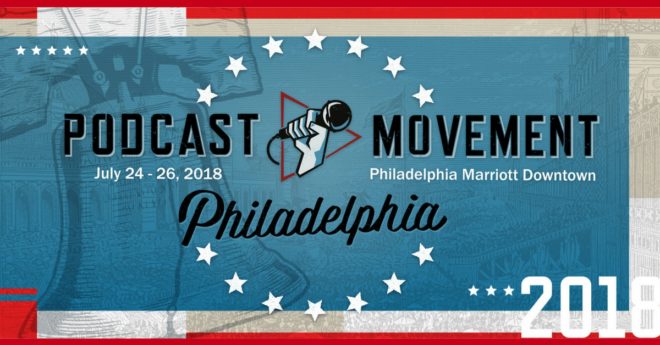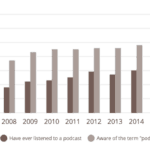Podcast Movement 2018 An Informative, Invigorating Whirlwind

Podcast Movement is an annual conference for podcasters meant “to bring together and educate active and aspiring podcasters, and to grow the podcast community and industry as a whole.” 2018’s Podcast Movement was held in Philadelphia from July 23rd-26th, taking place in the Marriott Philadelphia Downtown.
Before Podcast Movement, the only podcast event I’d been to was 2017’s PodCon, a convention in Seattle meant mostly for podcast fans but incorporating some panels and sessions for current and aspiring podcasters as well. PodCon’s focus was live shows, the DIY nature of podcasting, and the fan community with some emphasis in practical tips but a greater focus on entertainment. Podcast Movement, meanwhile, is an event focused very specifically on the industry of podcasting; most sessions involved practical tip, often focused on marketing and monetization. While the average age of a PodCon attendee was likely in their mid 20s, the average Podcast Movement attendee was likely to be in their mid 40s.
To be blunt, as a millennial with a focus on audio drama and crowfunding your work, I was initially wary about Podcast Movement. However, by the time I left, it felt clear that while both are opposite sides of the same coin, they’re also both integral to the world of podcasting.
This article will be an overview of my experience at Podcast Movement 2018. If you’d like a deeper dive into each session I attended, I live tweeted each to the best of my ability. The two sessions I attended that I could not tweet were a women podcaster speed networking event and “Podcast Makeover: Broadcasting Pros Critique Upcoming Podcasts,” both of which will be explained and discussed later on. Here is the start of each Twitter thread for each session I attended:
- New Podcaster Primer
- Speakers: Harry Duran, Corey Coates, and Jennifer Longworth
- Don’t Just Podcast: Building an Empire Around Your Show
- Speaker: Aaron Mahnke
- The Future is Fiction
- Speakers: John Dryden, Christy Gressman, Mac Rogers, Jonathan Mitchell
- Diversifying the Podcast Mediascape
- Speakers: Fran Tiando, Wummy Umude, Shereen Lani Younes
- Legal Issues for Podcasters and Content Creators
- Speakers: Jamie Lieberman, Gordon Firemark
- Turn Downloads into Dollars: Building a Lasting Audience Connection through Merchandise
- Speakers: James McArthur, Sarah Rhea Werner, Colt Cabana, John Goforth
- DIY Sponsorships: Pitching Sponsors, Setting Prices and Making Money for Indie Podcasts
- Speakers: Amanda McLoughlin, Eric Silver, Julia Schifini
- Well Produced Audio as Your Ticket to Success
- Speaker: Mike Russell
- Deconstructing the Interview Process
- Speaker: Alexis Parris
- Live Touring for Podcasts
- Speakers: Josh Lindgren, Julie Shapiro, Amanda McLoughlin
- The Network Effect: How Networks Get Podcasts to the Next Level and You Can Do Some of that Yourself
- Speakers: Audrey Mardavich, Colin Anderson, Josephine Martorana, Eric Cieslewicz
- All I Did Was Ask: An Afternoon with Terry Gross
- Speaker: Terry Gross
The Highlights
There is something undeniably lovely and unique about the experience of going to an event for podcasters, connecting faces to peoples’ podcasts or social media accounts, meeting like-minded creators, and being able to share information not through just business cards but also subscribing to someone’s podcast while speaking to them. Being surrounded by colleagues in the industry can be so refreshing; often, podcasting is an isolating experience, whether it be due to recording to due to the lack of podcast awareness of the general public. Events like Podcast Movement immerse you in the culture of podcasting, and that alone makes the event worth attending.
This feeling of camaraderie and face-to-face interaction was exemplified in the first event I attended: a speed networking opportunity for women podcasters. The event was, essentially, speed dating in a professional format. Each table had a color on it, and each attendee was given a card showing which color table they should sit at for the next round of speed networking. Each person was to answer a set of questions (their name, their podcast, what they were hoping to learn, etc.) in under a minute, then use the remaining time in the round to continue connecting before moving to the next table. Having this structure took the pressure off of us for networking. The format’s fast pace was initially anxiety-inducing but quickly added an air of silliness and levity that made answering the questions feel less like a pop quiz and more like a conversation. The women I met at this event wound up being people I spoke to consistently throughout the week, even if I only saw them for about ten minutes.
Podcast Movement isn’t just one long chance at networking, though; it’s also jam-packed with events that give practical, specific advice for podcasters of essentially any size, familiarity with the industry, and subject. The “New Podcast Primer” session was three hours of incredibly useful advice, many of which boiled down to an important sentiment: “There is no one best way to be a podcaster. The best way to be a podcaster is the way that makes sense to you, makes you feel comfortable, fits within your budget, and makes you enjoy podcasting.”
I was surprised by how much I enjoyed “Legal Issues for Podcasters and Content Creators,” which I attended for the purpose of hopefully collecting important information for podcasters that might make them uneasy. I know nothing about IP, copyright, or entertainment law, so I was initially worried this session would go over my head. Fortunately, it wound up being very direct and clear–and absolutely invaluable. Speakers Lieberman and Firemark had a focus on making their information accessible, stressing that legality in podcasting doesn’t have to be scary, it can be empowering. Mainly, the panel focused on the importance of writing out partnership agreements in writing with your co-hosts, producers, editors, etc., even without a lawyer. These agreements can be incredibly simple and fit on a single page, but they should outline everything that person is expected to do and be held liable for. Lieberman and Firemark also stressed making sure you’re having all of your guests sign disclosure agreements, even if it seems unnecessary or like too much work.
The “Turn Downloads into Dollars: Building a Lasting Audience Connection through Merchandise” was similarly practical and direct. In this panel, the speakers discussed their experiences with merchandise, what worked, and what didn’t. Having James McArthur of Tee Public–one of the leading on-demand merchandise vendors for podcasters–on the panel allowed direct statistics for how much merch is sold in which categories, as well as policies on how to navigate potential IP issues for artwork. The other speakers pointed out that while tee shirts are a large market for merchandise, you also need to think about what march your fans actually want to buy. The entire room agreed that merch will never be your top source of revenue, but instead should be thought of as a way of fan engagement and walking advertisement for your podcast.
“DIY Sponsorships: Pitching Sponsors, Setting Prices and Making Money for Indie Podcasts” felt like another valuable resource for new independent podcasters who might want sponsorships but not know how to land them. The panel focused on points most podcasters might not think about: calculating Cost per Acquisition (CPA) versus Cost per Mile (CPM) for pricing, reaching out to independent creators on Etsy or local creators who fit in with your podcast’s subject matter, and how to actually structure and schedule your sponsorship pitches and follow-ups. Speaker McLoughlin has written on the subject, and the panel’s expertise was accompanied by a sense of casual optimism that helped the content feel more engaging and less intimidating.
An event that’s difficult to capture without the experience of attending was “Podcast Makeover: Broadcasting Pros Critique Upcoming Podcasts.” In this session, the panel brought in two new podcasters who submitted their episodes to be reviewed by industry professionals live in front of the audience. Instead of the harsh criticism one would expect from, essentially, American Idol styled panels, what the applicants got were specific points of critique and praise that would help them re-edit their episodes and consider new directions for future episodes. Clips from the episodes were played, after which the panel gave advice like changing inflection, providing a roadmap of segments for listeners early on, moving up an introduction or definition earlier in the episode, etc. It’s a session that can’t be replicated over text–which displays exactly why attendance makes Podcast Movement so worthwhile. The critique given was specific to the clips being played, but could have been relevant to almost any podcaster.
And of course, getting to hear from the legendary Terry Gross surpassed my expectations. Her talk, the final official session for Podcast Movement, was a beautiful, moving ode to the importance of interview, leaving the audience in tears several times and leaving Gross with a standing ovation. Gross’s talk also focused on her journey to where she is now as a cornerstone of public radio, including the fact that her early radio shows left something to be desired. She also emphasized that to this day, she still worries about her interviews. “This never gets easy,” she said, but the room still left with the feeling that regardless, it was important, both for your interview guest and for yourself.
The Disappointments
Readers might know that often, my heart lies with audio drama, so it should come as no surprise that the panel I was most excited to see was “The Future Is Fiction.” The panel itself was a fantastic discussion on fiction and its importance in the podcast landscape; less fantastic, though, was its uniqueness at Podcast Movement. Fiction is gaining traction in podcasting from large podcast networks, TV studios, book publishers, and independent podcasters themselves. It’s a medium that’s both well-established and burgeoning, yet it was still massively under-represented at Podcast Movement. This panel was completely filled with attendees who clearly had an interest in audio drama, and I spoke with several audio drama creators during Podcast Movement. The need and the desire exists for more audio drama panels and sessions, and I hope that next years, these needs and desires will be fulfilled.
In the same vein, “Diversifying the Podcast Mediascape” was a phenomenal session that revealed some worries about the programming of Podcast Movement. This session focused on the lack of marginalized voices in much of the podcasting industry, and how both marginalized and non-marginalized voices can work towards a more diverse culture in podcasting. Speakers Tiando, Umude, and Younes spoke about their experiences both podcasting and speaking at events. In this discussion, Younes pointed out that event coordinators need to work with speakers of underrepresented perspectives on more than just panels about representation . . . to realize she had only been brought to Podcast Movement to speak on representation. While I’m extremely grateful to have experienced the conversation, it was a disappointing reminder that event coordinators still do need to be more mindful on diversifying their panels outside of just diversity panels.
Podcast Movement was also a whirlwind of events. While usually this worked in the event’s favor, giving attendees plenty of variety, it did also add a feeling of chaos and hurry. I attended 14 sessions at Podcast Movement out of a total of 127, meaning I was only able to attend about 11% of what was offered. At any given time slot, up to 10 different sessions would be occurring at once, making guests have to choose between potentially 10 different sessions that all could have been useful for them. This is natural for conventions to a point–booking several events at once is necessary, and this was somewhat managed by Podcast Movement having different tracks to follow–but the sheer abundance of Podcast Movement’s events was daunting.
Regardless of its disappointments, I left Podcast Movement not only feeling like I’d learned so much practical advice to bring back to podcasters, but also feeling like I’d made truly deep connections with others in the industry. It felt restorative, even with the high adrenaline of a conference, to be among people who understood the frustrations of editing, the anxiety of interviewing a guest, and the accomplishment of when an episode really lands with your audience. Even knowing I would be surrounded for a few days by people who definitely would not ask, “What’s a podcast?” felt fantastic. Podcast Movement may seem like an unnecessary or inconvenient experience for many new podcasters, but the knowledge, relationships, and inspiration you will gain by attending will likely outweigh the costs.













Comments
Comments are closed.